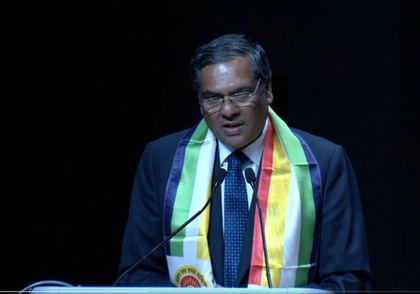Need to differentiate unintentional financial crimes from greed-driven ones: Ex-CJI Sanjiv Khanna
By IANS | Updated: October 11, 2025 14:25 IST2025-10-11T14:21:48+5:302025-10-11T14:25:04+5:30
New Delhi, Oct 11 Former Chief Justice of India Sanjiv Khanna on Saturday said there is probably a ...

Need to differentiate unintentional financial crimes from greed-driven ones: Ex-CJI Sanjiv Khanna
New Delhi, Oct 11 Former Chief Justice of India Sanjiv Khanna on Saturday said there is probably a need to treat unintentional financial offences differently from the premeditated ones that are driven by greed.
Addressing the TPF-Dayitva: National Legal Conference on Combating White-Collar Crime, organised by the Terapanth Professional Forum (TPF) at Bharat Mandapam, Former CJI Khanna said while ignorance of law cannot be a defence against committing a financial crime, “offences committed without malicious intent cannot be equated with offences that are motivated by greed and premeditated”.
Categorising financial offences in different categories, the Former CJI said that the most serious of the white collar crimes are the ones motivated by greed and include cases of fraud, embezzlement, insider trading, money laundering and bribery or corruption.
He said there is a prevailing perception that law enforcement agencies exist to harass rather than help, and this fear prevents people from approaching them, allowing cybercriminals to exploit the situation and harass individuals digitally.
“Instead of seeking justice, many end up paying the harassers out of fear,” he said, adding, “it’s time law enforcement became more approachable and public awareness increased, a two-way process that can truly help address the issue.”
He described white-collar crime as “an evolving threat that corrodes the moral fabric of society” and called for greater sensitivity in applying financial laws.
“Every act or failure to act that has financial implications cannot be painted with the same brush,” he said, urging lawmakers to distinguish between intentional fraud, unintentional error, and procedural lapse.
He added, “The strength of the justice system lies not in the severity of punishment but in the certainty of justice.”
Raj Kumar Nahataa, National Convenor, TPF, said, “White collar crime is not a victimless offence. Every scam robs us of opportunity, every fraud delays our development,”
He said in this wake there is an urgent need for the professional class to get ready to shoulder new responsibilities by becoming collective whistleblowers, guardians of ethics and protectors of our nation/s moral wealth.
Bringing a public health perspective, Dr Poonam Khetrapal, IAS (Retd) and Regional Director Emeritus, WHO South-East Asia Region, said white-collar crime in healthcare is not about money alone; it is about life and trust.
“When poor-quality care is knowingly delivered, when the poor are denied treatment despite entitlement, and when safety rules are ignored for profit, it ceases to be negligence. It becomes a white-collar crime,” she said.
Citing a landmark global study, Dr Khetrapal noted that 8.6 million preventable deaths occur globally every year due to poor-quality healthcare, including 1.6 million in India. She called for “robust forensic auditing, health outcome tracking, regulatory performance indicators, and judicial oversight,” adding that accountability must “follow the money -- from boardrooms to approval desks.”
Offering an economic perspective, Ashish Kumar Chauhan, Managing Director and CEO of the National Stock Exchange (NSE), observed that as societies become more prosperous, “crimes turn more white.”
Citing a senior judge’s observation, he noted that the ratio of violent to commercial crimes had reversed over two decades, from 80 per cent physical offences to 80 per cent financial or cybercrimes. “Today, money is no longer stolen from pockets but from systems. UPI may have removed cash, but not corruption. It has only made the thefts digital,” he remarked.
The TPF–Dayitva Conference, attended by over a thousand professionals from law, finance, medicine, and academia, featured discussions on ethics, compliance, governance, and the evolving statutory framework to address financial crimes - aligning with India’s vision of ‘Viksit Bharat 2047’.
As the day concluded, a unifying message echoed across the sessions: India’s journey towards development will remain incomplete without restoring public faith and integrity in institutions. As Justice Khanna summed up, white-collar crime “challenges not only the boundaries of law but the conscience of governance itself.”
Disclaimer: This post has been auto-published from an agency feed without any modifications to the text and has not been reviewed by an editor
Open in app